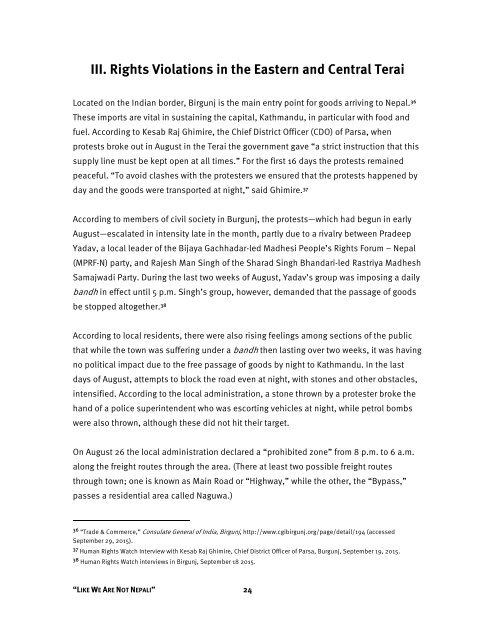“Like We Are Not Nepali”
7KiiNLWaT
7KiiNLWaT
You also want an ePaper? Increase the reach of your titles
YUMPU automatically turns print PDFs into web optimized ePapers that Google loves.
III. Rights Violations in the Eastern and Central Terai<br />
Located on the Indian border, Birgunj is the main entry point for goods arriving to Nepal. 36<br />
These imports are vital in sustaining the capital, Kathmandu, in particular with food and<br />
fuel. According to Kesab Raj Ghimire, the Chief District Officer (CDO) of Parsa, when<br />
protests broke out in August in the Terai the government gave “a strict instruction that this<br />
supply line must be kept open at all times.” For the first 16 days the protests remained<br />
peaceful. “To avoid clashes with the protesters we ensured that the protests happened by<br />
day and the goods were transported at night,” said Ghimire. 37<br />
According to members of civil society in Burgunj, the protests—which had begun in early<br />
August—escalated in intensity late in the month, partly due to a rivalry between Pradeep<br />
Yadav, a local leader of the Bijaya Gachhadar-led Madhesi People’s Rights Forum – Nepal<br />
(MPRF-N) party, and Rajesh Man Singh of the Sharad Singh Bhandari-led Rastriya Madhesh<br />
Samajwadi Party. During the last two weeks of August, Yadav’s group was imposing a daily<br />
bandh in effect until 5 p.m. Singh’s group, however, demanded that the passage of goods<br />
be stopped altogether. 38<br />
According to local residents, there were also rising feelings among sections of the public<br />
that while the town was suffering under a bandh then lasting over two weeks, it was having<br />
no political impact due to the free passage of goods by night to Kathmandu. In the last<br />
days of August, attempts to block the road even at night, with stones and other obstacles,<br />
intensified. According to the local administration, a stone thrown by a protester broke the<br />
hand of a police superintendent who was escorting vehicles at night, while petrol bombs<br />
were also thrown, although these did not hit their target.<br />
On August 26 the local administration declared a “prohibited zone” from 8 p.m. to 6 a.m.<br />
along the freight routes through the area. (There at least two possible freight routes<br />
through town; one is known as Main Road or “Highway,” while the other, the “Bypass,”<br />
passes a residential area called Naguwa.)<br />
36 “Trade & Commerce,” Consulate General of India, Birgunj, http://www.cgibirgunj.org/page/detail/194 (accessed<br />
September 29, 2015).<br />
37 Human Rights Watch Interview with Kesab Raj Ghimire, Chief District Officer of Parsa, Burgunj, September 19, 2015.<br />
38 Human Rights Watch interviews in Birgunj, September 18 2015.<br />
“LIKE WE ARE NOT NEPALI” 24


